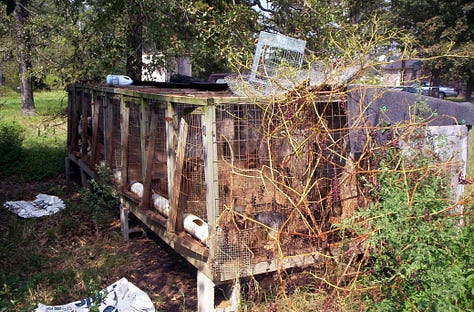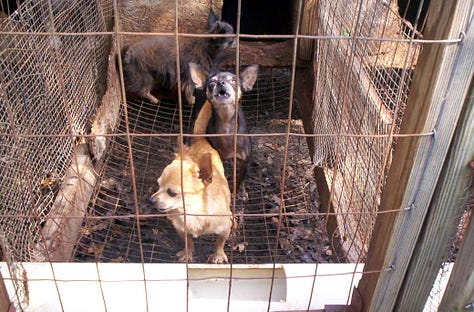America's Canine Cruelty Trade: How the Puppy Mill Pipeline Fuels a National Crisis
Buyer Beware: Breeders Front for Deplorable Puppy Mills
In the sweltering heat of a Riverside County garage, dozens of puppies languish in cramped cages—a distressing snapshot of a larger, nationwide crisis. Despite California’s legislative efforts to curb the import of dogs from puppy mills, the illicit trade continues to flourish underground. A recent investigation by the Los Angeles Times reveals that this hidden pipeline is thriving, exacerbating problems for adopters, buyers, animal shelters, and communities across the state and country.
The Hidden Network
Truckloads of puppies, primarily sourced from large-scale breeders in the Midwest, are smuggled into California and sold through shady networks. These puppies often end up in the hands of individuals posing as local breeders, deceiving consumers who believe they are buying from a reputable source. Laws intended to halt the flow of commercially bred dogs into the state have pushed the trade deeper into the shadows, creating a market rife with deception. The Los Angeles Times report reveals that since 2018, tens of thousands of puppies have entered California through this pipeline, with many arriving sick or poorly socialized, leading to heartache for unsuspecting buyers.



A National and International Concern
While California’s struggle is significant, this issue extends far beyond state lines. The Humane Society’s "Horrible Hundred" report reveals that at least 18 states, with Missouri and Iowa as epicenters, host rampant puppy mill operations. Puppies bred in these mills are sold across the country, through pet stores, online marketplaces, and classified ads—often with misleading claims about the conditions in which they were raised. Globally, puppy mill-like practices have been reported in various countries, as high demand continues to drive unethical breeding practices.
Potential pet owners, whether in the U.S. or abroad, must stay vigilant. As the demand for puppies grows, the risk of unknowingly supporting cruel breeding operations rises. Consumers must educate themselves about the origins of their pets, recognizing that similar hidden trade networks might exist in their regions.
For Adopters and Buyers, the Stakes Are High
The emotional toll of this trade on pet owners is profound. Many buyers, lured by the promise of a healthy, well-bred puppy, instead find themselves caring for sick animals that suffer from genetic disorders, respiratory infections, or behavioral issues. These problems often lead to hefty veterinary bills and the heartbreak of watching a new family member suffer. The lack of transparency in this market shields unscrupulous breeders from accountability, leaving buyers vulnerable. Anecdotes from families who've purchased puppies only to discover they were bred in squalor highlight the urgent need for consumer diligence when acquiring pets.
Strain on Animal Shelters
Animal shelters are bearing the brunt of this crisis. Overrun and underfunded, shelters are now dealing with an influx of unsocialized, poorly bred dogs that are difficult to rehome. These animals often require extra care, time, and training before they can be adopted, adding to already strained resources. Shelters, which are typically focused on rescuing homeless or surrendered animals, find themselves overwhelmed as they contend with the unintended consequences of puppy mill trafficking.
Community Consequences
Beyond shelters and individual buyers, the broader community suffers as well. The proliferation of puppy mills contributes directly to the overpopulation crisis, fueling higher abandonment and euthanasia rates. For municipal governments, this leads to increased animal control costs. Public health risks also loom large: poorly bred and inadequately cared-for animals are more likely to carry zoonotic diseases, which can be transmitted to humans, as well as behavioral issues that can endanger people.
In one notable case reported by the Los Angeles Times, a Midwest puppy mill operated by Steve Kruse continued to function despite numerous violations, including keeping dogs with untreated infections and serious health issues. Such conditions, commonly found in large-scale breeding operations, highlight the need for greater vigilance and stronger enforcement to safeguard both animal welfare and public health.
A Call to Action
Addressing this crisis requires action on multiple fronts. Consumers must educate themselves and choose to adopt from reputable shelters or rescue organizations. Tools like breeder verification websites, local animal welfare organizations, and transparent adoption agencies can help consumers avoid supporting cruel breeding practices.
On a larger scale, stronger regulatory frameworks and enhanced enforcement mechanisms are needed. Existing laws must be enforced more rigorously, and new policies should close loopholes that allow these operations to thrive in the shadows. Lawmakers, animal welfare organizations, and the public must collaborate to dismantle the puppy mill pipeline and promote a humane, transparent pet market.
Additionally, contacting local city or town councils to advocate for closing gaps in existing laws and empowering animal control to investigate and prosecute cases of animal cruelty is crucial. Engaging with local government can lead to the development of more robust animal welfare policies and increased resources for enforcement agencies.
The journey from puppy mills to pet stores is fraught with neglect and deception. As the Los Angeles Times investigation reveals, this is a crisis that demands urgent attention from all stakeholders. Protecting these voiceless victims and preventing further suffering requires immediate and concerted action—because every dog deserves a better start in life.
Ed Boks is a former Executive Director of the New York City, Los Angeles, and Maricopa County Animal Care & Control Departments. His work has been published in the LA Times, New York Times, Newsweek, Real Clear Policy, Sentient Media, and now on Animal Politics with Ed Boks. He is available for consultations at animalpolitics8@gmail.com





Ed,
Here is an idea. Certification or Registration. Just as there is certification or registration for certain professions, make dog breeding a registered profession, overseen by state and national registrars.
Breeders would have to meet strict requirements, such as training, record keeping, medical records, as in all or many other registered professions. There would be yearly inspections, compliance officers and a complaint mechanism system. All legally registered breeders would be listed in an online database that would-be buyers could look up online.
Therefore, trust and transparency is established. I think this would be a good start. What do you think?
Not Debbie aproovd, hoomin hurt dog is bad >:-(